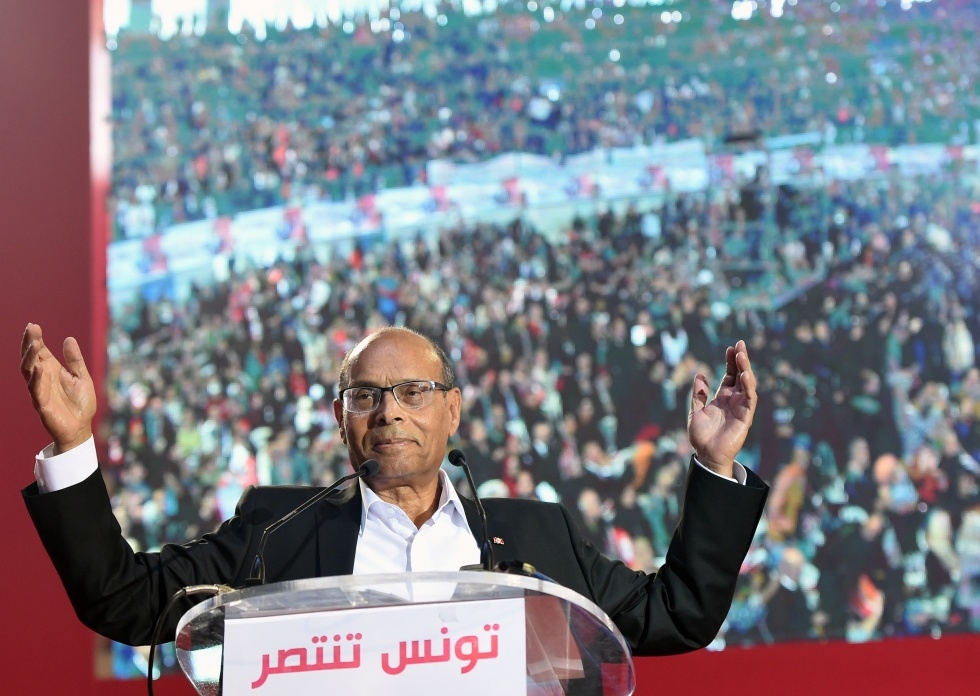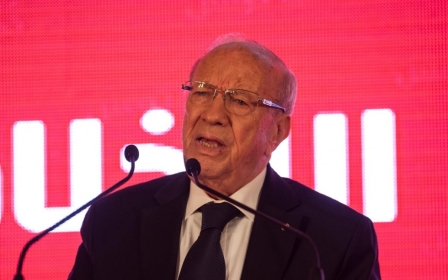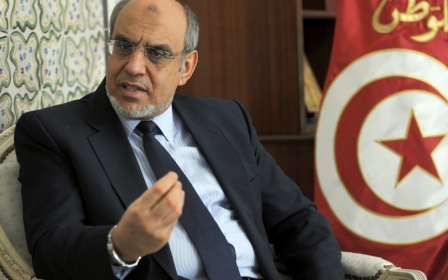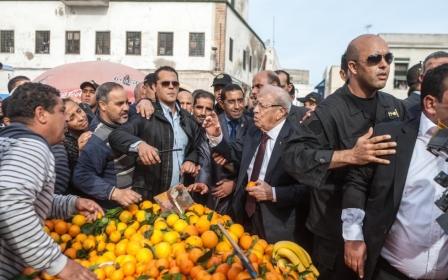Tunisia's Marzouki: The revolution's candidate?

It is no coincidence that Moncef Marzouki was the only one of Tunisia’s two presidential candidates who on 17 December – the fourth anniversary of the Arab Spring – visited the place where it all began.
A medical doctor who became one of the country’s best-known human rights activists, Marzouki chose to make one of his last campaign stops before Sunday’s election in the southern town of Sidi Bouzid. It’s here that the impoverished stall-holder, Mohamed Bouazizi, immolated himself.
His death struck a chord which led to the massive street protests that toppled Tunisian strongman Zine El Abidine Ben Ali and led to similar protests in Cairo, Sanaa, Tripoli and beyond.
Everywhere that Marzouki, who will be 70 next year, has campaigned for president, he has sought to revive the spirit of the Arab Spring, arguing that the election choice on 21 December will be between democratic progress and a return to authoritarianism.
His opponent, Beji Caid Essebsi, who led Marzouki by little more than 6 percent in the first round, was the speaker of parliament at the start of Ben Ali’s rule, and is supported by most of the country’s old elite.
His party, Nidaa Tounes, won the parliamentary elections in October and is set to nominate a prime minister and the new government as soon as the presidency is decided.
In his speech in Sidi Bouzid Marzouki told voters a victory for himself on Sunday would ensure that both the presidency and the government were not in the same hands.
“A balance of power is essential to guarantee there is no return to dictatorship as well as to reinforce the foundations of our nascent democracy,” he declared.
Marzouki’s effort to portray the election in these terms is a clear repudiation of Essebsi’s tactics which claim that Sunday’s vote is a choice between secularism and Islamism.
He has tried to paint Marzouki as a puppet of Ennahda, the party which won the country’s first free elections in 2011 but has subsequently lost ground. Ennahda is often referred to as Tunisia’s Muslim Brotherhood branch but it grew out of very specific local concerns and is not seen as dogmatic, showing itself willing to compromise and share power.
While Marzouki was elected to become Tunisia’s interim president in 2011 by the constituent assembly in which Ennahda had most seats, he disagrees with the party on many issues. For instance, Marzouki is a firm secularist who has long opposed capital punishment, a position that Ennahda does not support. However, the president's role is limited, and there was a limit to how much influence Marzouki could wield.
Marzouki’s qualified backing and respect for Ennahda instead largely stems from his concern about human rights protections and his recognition all groups are legitimate part of Tunisian society.
His father emigrated to Morocco in the 1950s under political pressure for opposing President Habib Bourguiba, and Moncef Marzouki only returned to his homeland in 1979.
He founded the African Network for Prevention of Child Abuse and joined the Tunisian League for Human Rights. He publicly confronted the new President Ben Ali and urged him to observe the law when the dictator suppressed Ennahda, jailing many of its leaders and driving others into exile.
In 2001, Marzouki founded the Congress for the Republic, a small party which won four seats in the elections this October.
Concern for human rights also led Marzouki, as President in 2012, to break diplomatic relations with Bashar al-Assad’s Syria. His current opponents, Nidaa Tounes, have hinted they will restore them if Essebsi wins on Sunday.
Similarly, Marzouki roundly condemned last year’s coup in Egypt and the subsequent plethora of human rights abuses, including the banning of the Muslim Brotherhood.
A key element in Sunday’s vote is the role that Ennahda supporters will play, given that the party leadership has come out against endorsing either candidate.
Many will no doubt vote for Marzouki regardless and will do so because they agree with his view that an Essebsi victory would make a return to authoritarianism more likely. Marzouki has deliberately avoided calling for Ennahda’s backing so as not to encourage the line that the choice on Sunday is about Islamism or secularism.
The question is whether enough Ennahda supporters will be energised to allow Marzouki to close the 6 per cent gap between him and Essebsi in the first round.
But to suggest Marzouki is putty in Ennahda’s hands is incorrect. For one thing it is not clear Ennahda’s leaders want him to win. Ennahda’s leadership is being careful not to support Marzouki publicly or attack Essebsi, precisely because many senior Ennahda figures would like to form a coalition government with Nidaa Tounes.
Some Ennahda leaders, reportedly including its president, Rachid Ghannouchi, see this as genuinely the best option. Others see it as a necessary survival strategy in case Essebsi rather than Marzouki wins on Sunday. To many of Ennahda’s rank and file both positions seem ultra-cautious and an abdication of the party’s responsibility.
It has also upset some Ennhada leaders. Hamadi Jebali, Ennahda’s secretary-general who served briefly as prime minister resigned from the party earlier this month. He said he wanted to “serve the objectives of the revolution”. His words were similar to what we have heard so far from Marzouki, who continues to insist that everything is left to play for in Sunday’s vote.
Middle East Eye propose une couverture et une analyse indépendantes et incomparables du Moyen-Orient, de l’Afrique du Nord et d’autres régions du monde. Pour en savoir plus sur la reprise de ce contenu et les frais qui s’appliquent, veuillez remplir ce formulaire [en anglais]. Pour en savoir plus sur MEE, cliquez ici [en anglais].




